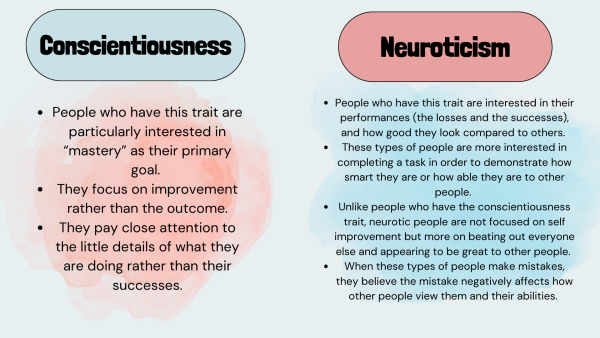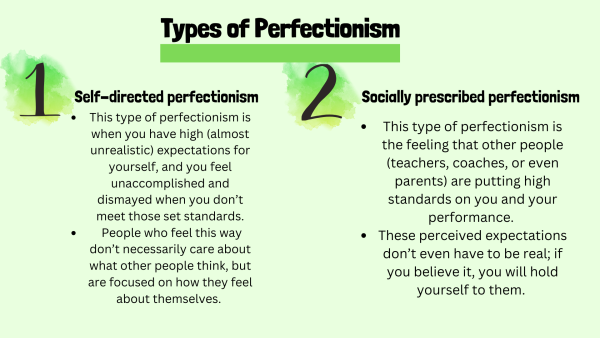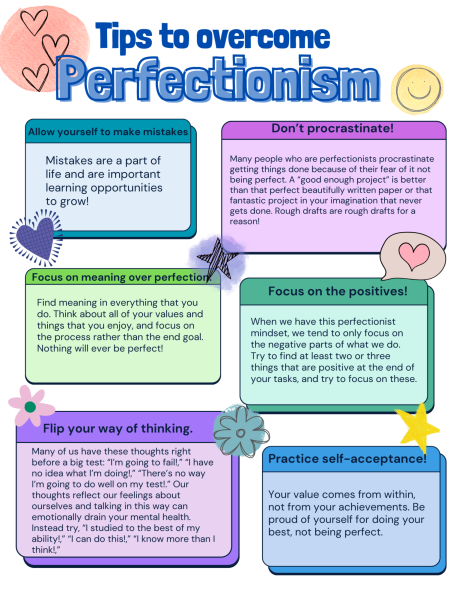As the school year trudges along, this particular time of year is filled with a staggering amount of stress, anxiety, piles of assignments, hours spent studying for quizzes and tests, panicked thoughts over exams- it’s a lot.
I know I’ve been swamped with homework and the impending nervousness over tests (and exams) these past weeks, leading up to what is supposed to be the “happiest time of the year.” (Not to mention with the spring semester coming up after the break, this never-ending cycle painfully starts all over.) On top of this already mountainous load of stress, I am the type of person to place more stress on myself because of my overwhelming desire for everything I do to be “perfect.”

Many students here at SSA struggle with these same high standards they set for themselves, or even by their parents, which can prompt stress, anxiety and tears. These stress-inducing high standards are known as perfectionism.
This type of stress is not defined as the “drive” or “desire” to do a good job, or just having high expectations for yourself; it’s more about the fear of failure, worrying over your perceived appearance in front of others and threats to your self-esteem.
According to Dr. John D. Rich Jr. (associate professor of psychology from Delaware State University), perfectionism stems from two different personality traits that are considered a part of the “5 Big” Personality Traits of an individual. These two traits are called conscientiousness and neuroticism. Rich explains that scientists are particularly interested in these traits because conscientiousness and neuroticism directly correlates to different types of thinking and goal orientations that can lead to stress caused by unrealistically high standards.
 Knowing which trait is more prevalent in yourself helps you to determine if the high standards you are feeling are impacted by high benchmarks set for yourself or the idea that you have to be perfect in public to attain someone else’s. Being more aware of this can help you change your mindset about these standards.
Knowing which trait is more prevalent in yourself helps you to determine if the high standards you are feeling are impacted by high benchmarks set for yourself or the idea that you have to be perfect in public to attain someone else’s. Being more aware of this can help you change your mindset about these standards.
From here, you can determine which type of mindset you have. Identifying where your standards stem from can help you to work on correcting your thought process around these beliefs.
Dr. Rich explains there are three different types of perfectionism (two will be listed here because it pertains particularly to this article).
 How exactly can someone overcome perfectionism? Below is a list of several different ways from Oregon Counseling. All of these ways may not work for you or some might and some might not. You should just be proud of yourself for identifying your perfectionistic tendencies and working to correct them.
How exactly can someone overcome perfectionism? Below is a list of several different ways from Oregon Counseling. All of these ways may not work for you or some might and some might not. You should just be proud of yourself for identifying your perfectionistic tendencies and working to correct them.
 Achieving a “nothing is perfect” mindset is not going to be easy. I have been working to change my negative thought process since last May and I still continue to struggle with it. Don’t get me wrong, I have come a long way since May, but I’ve had moments where I have sunk back into my negative thinking habits. That is okay! Like this article affirms, your mindset is never going to be “perfectly” positive all of the time. It is okay to feel doubt, anxiety, or frustration over a task, assignment or extracurricular activity that is going on in your life.
Achieving a “nothing is perfect” mindset is not going to be easy. I have been working to change my negative thought process since last May and I still continue to struggle with it. Don’t get me wrong, I have come a long way since May, but I’ve had moments where I have sunk back into my negative thinking habits. That is okay! Like this article affirms, your mindset is never going to be “perfectly” positive all of the time. It is okay to feel doubt, anxiety, or frustration over a task, assignment or extracurricular activity that is going on in your life.
This article is also not saying to not have standards for yourself. Standards are okay (you should have good standards for yourself) just DO NOT let your standards destroy your mental health. Your standards should not define your worth. Always remember, grades do not define you, and a bad grade does not mean you are a failure. Remember that being the “best” or “worst” at something doesn’t define your value. One mistake doesn’t mean your life is over. Mistakes are a part of life, and allow us to learn and grow into the person we are to become. Perfection is unachievable, and “A diamond with a flaw is better than a common stone that is perfect,” (Chinese Proverb).
If you are looking for more ways to overcome perfectionism, click the links below!
https://hbr.org/2019/04/how-to-manage-your-perfectionism
https://www.verywellmind.com/overcoming-perfectionism-how-to-work-past-perfectionism-3144700
https://www.choosingtherapy.com/how-to-overcome-perfectionism/
Sources:
https://www.psychologytoday.com/us/blog/parenting-purpose/201710/the-pressure-be-perfect
https://oregoncounseling.com/article/10-ways-to-overcome-perfectionism/


